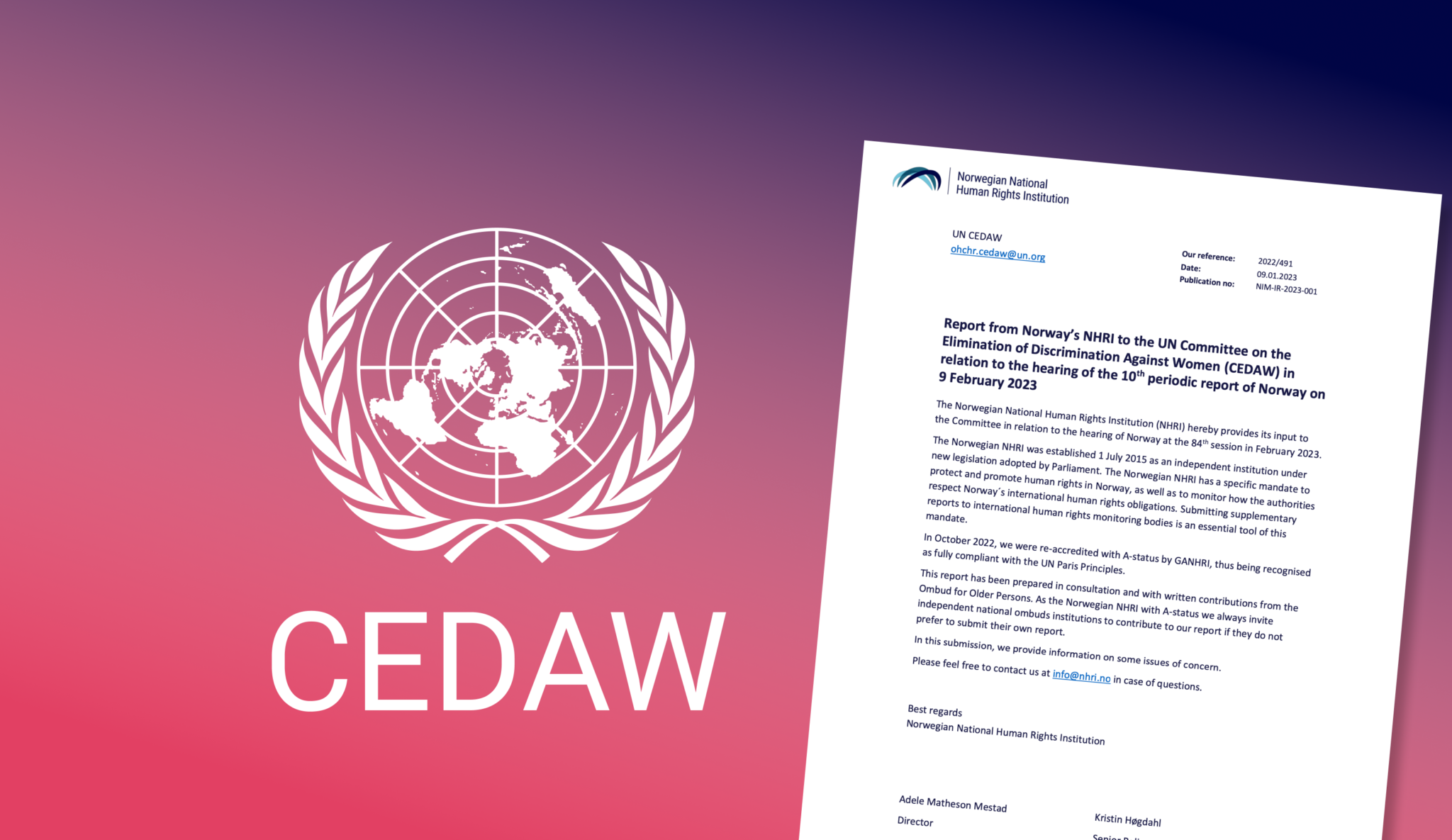NIM has submitted its supplementary report to the UN Committee on the Elimination of All Forms of Discrimination Against Women, ahead of the Committee’s assessment of Norway in February. The availability of crisis centres (shelters), investigation and prosecution of violence against women, and violence against vulnerable groups of women are some of the topics in the report.
The full report is available here.
The Committee’s mandate is to monitor States’ compliance with their obligations under the UN Convention on the Elimination of All Forms Discrimination Against Women. As part of this, the Committee holds regular sessions in dialogue with State authorities and civil society and adopts recommendations on how the State can better protect women’s rights.
Ahead of the upcoming session, the Norwegian authorities have submitted a State Report, in which they answer questions from the Committee and explain how they believe Norway is fulfilling its obligations under the Convention.
The Equality and Anti-Discrimination Ombud and a coalition of civil society organisations have also submitted their own supplementary reports to the Committee.
NIM submitted its supplementary report to the Committee on 9 January 2023. In the report, NIM addresses a total of eleven topics. The report has been written in consultation with the Ombud for Older persons.
Main topics in the report
Violence against women
The majority of the topics covered in NIM’s supplementary report are related to violence against women.
Firstly, NIM addresses challenges in the State’s efforts to combat and prevent domestic violence. NIM also raises challenges such as long case processing times in rape cases, and shortcomings in the provisions of the Norwegian Penal Code regarding sexual offences.
In addition, we address the challenges faced by certain vulnerable groups of women, including the availability of support services for Sámi women exposed to violence and issues relating to the prevention of violence against older women. NIM also highlights the need for measures against and more research on violence against queer women, and the lack of sufficient support services for women with substance abuse problems who are exposed to violence.
Crisis centres and municipal action plans against domestic violence
NIM also highlights challenges related to municipalities’ responsibilities to prevent domestic violence and to provide support services for victims. In particular, we note that few municipalities have action plans against domestic violence, that many municipalities struggle to provide sufficient support services for vulnerable groups of women, and there are shortcomings in the follow-up of victims of violence after they leave crisis centres.
Conditions for women in prison
In the report, NIM also addresses the conditions for women in prison, and refers, among other things, to long-standing criticism from the Equality and Anti-Discrimination Ombud and the Anti-Discrimination Tribunal regarding conditions for female inmates in Tromsø prison.
Other topics
Other topics NIM addresses in the report include harassment and hate speech against women, the 2017 reform of the Equality and Anti-Discrimination Ombud and the Anti-Discrimination Tribunal, health rights for undocumented women, child poverty, and follow-up of previous recommendations from Committee and other UN human rights monitoring bodies.
The topics in the report have been selected on the basis of the issues prioritised by the Committee ahead of the hearing, the topics covered in the State report, the Committee’s previous recommendations to Norway and NIM’s own monitoring work. The report is not intended to provide an exhaustive list of human rights challenges faced by women in Norway.
Tenth hearing of Norway
The Committee’s assessment of Norway will take place on 9 February 2023 in Geneva. This will be the tenth time Norway will be heard by the Committee since it ratified the Convention in 1981. NIM will attend, along with a number of other institutions and organisations.
Following the session, the Committee will make recommendations about how it believes Norway can best comply with its obligations under the Convention. Such recommendations are not legally binding, but they provide important guidance and may carry significant weight as authoritative interpretations of Norway’s obligations under international law.
The full report is available here.
The State report is available here. (regjeringen.no)
The Civil Society Coalition’s supplementary report is available here. (fokuskvinner.no)
